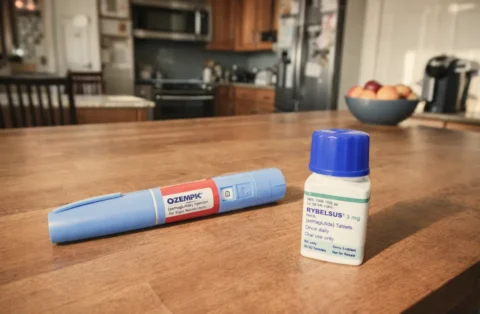What you’ll learn
You’ll find straightforward answers to questions patients ask most about tirzepatide as a weight loss treatment. We’ll cover storage, side effects, interactions, and safety concerns so you can use your medication with confidence and safety.
Starting a new medication like tirzepatide, commonly known by brand names Mounjaro® or Zepbound®, can bring up a lot of important questions. And that’s a good thing. Asking questions is the first step toward taking control of your health. Before beginning any treatment, it’s important to feel informed, supported, and confident in your decision.
Tirzepatide is a medication used to support both blood sugar control in type 2 diabetes and medical weight loss. It works by mimicking two naturally occurring hormones in your body: GLP-1 (glucagon-like peptide-1)and GIP (glucose-dependent insulinotropic polypeptide). These hormones help regulate your blood sugar, improve metabolic health, and promote significant weight loss when paired with the right lifestyle changes.
At QuickMD, we hear questions about tirzepatide from patients all the time. Our licensed providers specialize in weight management and obesity medicine, and understand that having clear, trustworthy information makes all the difference in your treatment success.
Whether you’re just starting to explore tirzepatide or are already using it and want to learn more, we’ve compiled a list of frequently asked questions to guide you through the most important information. Read on for answers to common questions and concerns.
1. How long does tirzepatide last in the fridge?
Brand-name tirzepatide, like Mounjaro® and Zepbound® ,will stay good in your fridge until the expiration date printed on the box, usually several months out. Once you start using a pen, it’ll still be effective for quite a while when kept cold at 36-46°F (2°C-8°C).
The key thing is to always check that date on your specific medication rather than trying to remember general rules. Different batches might have slightly different dates, and you want to be sure you’re getting the full benefit from your medication.
2. What are the proper storage guidelines for tirzepatide shelf life?
Your Mounjaro® single-dose pen or vial can be stored unrefrigerated for up to 21 days, not to exceed a room temperature of 86ºF (30ºC).
You do not want to leave it in a hot car or near heat sources. When traveling, use an insulated medication case with ice packs to maintain proper temperature.
3. What should I do if I miss a tirzepatide dose?
If you miss your weekly injection and fewer than 4 days have passed since your scheduled dose, take it as soon as you remember. If more than 4 days have passed, skip the missed dose and resume your regular weekly schedule.
Never take two doses close together. This makes you way more likely to feel sick to your stomach. Missing one dose occasionally won’t compromise your overall treatment progress, though, so don’t worry.
4. How does tirzepatide work for weight loss?
Tirzepatide activates the two hormone receptors we mentioned earlier: GLP-1 and GIP. These hormones slow down how fast food leaves your stomach, so you feel full longer. They also improve insulin sensitivity and glucose metabolism.
The result is reduced appetite, better blood sugar control, and gradual weight loss when combined with appropriate lifestyle modifications, including healthy eating and regular exercise.
5. How do I manage severe stomach pain while taking tirzepatide?
Severe, persistent stomach pain requires immediate medical attention, especially when accompanied by nausea, vomiting, or trouble swallowing.
These symptoms could indicate pancreatitis, a serious inflammation of the pancreas that can spread pain to your back and requires prompt medical treatment. This isn’t something to tough out at home. Call your doctor right away or consider urgent care if you have stomach pain that doesn’t get better when you rest or change positions.
Mild stomach discomfort is way more common and usually gets better with some simple changes to how you eat. Try smaller meals more often throughout the day, and skip anything greasy, fatty, or spicy for a while. Most people find that their stomach issues get much better after the first few weeks, once their body gets used to the medication.
6. What are the symptoms of low blood sugar with tirzepatide?
Low blood sugar (hypoglycemia) causes shakiness, sweating, confusion, dizziness, rapid heartbeat, difficulty concentrating, anxiety, excessive hunger, and feeling weak or tired.
Tirzepatide is glucose-dependent, which means it mainly kicks in when your blood sugar is actually high. But you can still have low blood sugar episodes, especially if you’re taking other diabetes medications like insulin or sulfonylureas (diabetes pills that help your body make more insulin).
Always carry glucose tablets, glucose gel, or even hard candy with you, and get to know what low blood sugar feels like for you personally. If it happens, reach for glucose tablets or gel, honey, sugar cubes, or drink some fruit juice or regular soda. Basically, anything with quick sugar. If you’re having frequent low blood sugar episodes, definitely talk to your provider.
7. Can tirzepatide cause trouble breathing or swallowing?
Trouble breathing or swallowing is rare, but when it happens, it’s serious.
These could mean you’re having a severe allergic reaction or something else that needs immediate emergency care. If you’re having any trouble breathing, can’t swallow properly, or notice your face, lips, tongue, or throat swelling up, call 911 or get to the emergency room right away.
This doesn’t happen often, but it can be dangerous if you don’t get help quickly. Don’t wait to see if symptoms improve on their own.
8. Does tirzepatide affect how birth control pills work?
Yes, and this is something we definitely want you to know about. Tirzepatide can make birth control pills less effective. A 2024 study published in the Journal of the American Pharmacists Association found that it significantly reduces how much of the hormone your body actually absorbs.
Here’s what happens: tirzepatide slows down how quickly food moves through your stomach, and unfortunately, that affects how well your body absorbs birth control hormones, too. This is especially true when you’re first starting tirzepatide or when your dose gets bumped up.
9. How does tirzepatide affect blood pressure?
Here’s some genuinely good news: tirzepatide typically helps lower blood pressure.According to research published in Hypertension, people saw their numbers drop by 7 to 10 points on the top number. For most people, this is great news. Lower blood pressure means less strain on your heart and better overall health.
But if you’re already taking blood pressure medications, this is something your doctor needs to keep an eye on. You might need your doses adjusted so your pressure doesn’t drop too low. Don’t try to adjust your blood pressure meds yourself. That’s definitely a job for your provider. They’ll want to monitor you more closely, especially in the beginning, to ensure everything stays within a good range.
10. Is tirzepatide safe if I have a history of thyroid cancer?
This is one of those situations where family history really matters. Tirzepatide comes with a warning about thyroid tumors, specifically a rare type called medullary thyroid cancer. In animal studies, the medication caused thyroid tumors, though we don’t know for sure if this happens in people.
If you or anyone in your family has had medullary thyroid cancer or something called Multiple Endocrine Neoplasia syndrome type 2 (a rare condition that causes tumors), tirzepatide isn’t right for you. It’s just not worth the risk. Make sure you tell your provider about any family history of thyroid problems or unusual tumors.
Even if you don’t have this history, keep an eye out for warning signs like a lump in your neck, changes in your voice, trouble swallowing, or shortness of breath. These don’t necessarily mean you have a problem, but they’re definitely worth getting checked out.
11. Can I drink alcohol while taking tirzepatide?
Alcohol can increase your risk of low blood sugar and may worsen digestive side effects like nausea and stomach pain. If you do choose to drink, keep it moderate and always have some food with your alcohol to help prevent your blood sugar from dropping too low. It’s a good idea to check your blood sugar more often on days when you drink, and definitely talk to your provider about your drinking habits to make sure it fits safely with your treatment.
12. What lifestyle changes help tirzepatide work most effectively?
Tirzepatide works best when you pair it with healthy changes you can actually stick with, mainly around what you eat and how you move. Focus on lean proteins like chicken, fish, and Greek yogurt, along with vegetables, whole grains, and healthy fats. Try to cut back on processed foods, added sugars, and refined carbs when you can.
Getting regular exercise helps you keep your muscles while you’re losing weight and makes your body better at using insulin. All of this works together with tirzepatide to help you lose weight and keep your blood sugar steady.
For more tips on nutrition and lifestyle changes that support weight loss medications, check out our Learning Center for practical guidance and expert insights.
13. How do I handle nausea and other digestive side effects?
Nausea is the most common tirzepatide side effect, especially when you’re first starting treatment or bumping up your dose. Most people feel much better after the first few weeks once their body gets used to the medication.
Here are some things that really help: eat smaller meals more often throughout the day, skip anything greasy, fatty, or spicy for a while, drink plenty of water, and try some ginger tea or ginger supplements to calm your stomach. If the nausea sticks around or gets really bad, reach out to your QuickMD provider about adjusting your dose.
14. What should I know about dry mouth and other common side effects from tirzepatide?
Dry mouth, headaches, and feeling tired can be common, but they’re usually temporary. For dry mouth, drink water throughout the day and try sugar-free gum or lozenges to get your saliva going again.
Stick to regular sleep times to help with the fatigue, and keep drinking water to help prevent headaches, too. These things usually go away as your body gets used to the medication, but definitely reach out to your QuickMD provider if they stick around or start messing with your daily routine.
15. When should I seek medical attention while taking tirzepatide?
Get emergency help immediately for severe stomach pain (especially if it spreads to your back), can’t stop throwing up, trouble breathing, trouble swallowing, or signs of a serious allergic reaction.
Also, watch out for pancreatitis symptoms: intense stomach pain, nausea, vomiting, and fever. Get medical attention for side effects that won’t go away, frequent low blood sugar episodes, or anything that feels off about how your body is reacting to the medication.
Staying in touch with your provider helps keep you safe and makes sure the treatment is working well for you.
16. How often should I see my QuickMD provider while taking tirzepatide?
It depends, but during your first few months on tirzepatide, you might meet more frequently to keep track of how you’re doing, adjust your dose if needed, and deal with any side effects that may arise.
During these check-ins, your QuickMD provider will see how your weight loss is going, keep an eye on your blood sugar if you have diabetes, watch for any issues, and make adjustments to help you get the best results.
17. What should I discuss with my healthcare provider about tirzepatide?
Be open about all medications and supplements you’re taking, as some can interact with tirzepatide. Share any health conditions you have, especially heart problems, kidney issues, digestive troubles, or mental health concerns like depression or anxiety.
Tell them about any side effects, even the small ones. This helps your provider adjust things to work better for you and keep you safe. And ask about anything that doesn’t make sense or worries you. That’s what we’re here for.
18. How many calories should I eat daily on tirzepatide?
There’s no universal number, but most people benefit from a moderate calorie deficit, typically 1,200-1,800 calories daily, depending on your age, weight, activity level, and goals. Your QuickMD provider can help determine the right caloric intake for your individual needs and weight loss objectives.
19. Should I avoid certain snacks while on tirzepatide?
Yes, limit processed snacks high in refined carbohydrates, added sugars, or unhealthy fats, as these can cause rapid blood sugar spikes and slow your weight management progress. Instead, choose snacks that combine protein with fiber, like Greek yogurt with berries, apple slices with almond butter, or vegetables with hummus.
20. Can I eat sweets while taking tirzepatide?
You don’t have to give up sweets entirely, but focusing on nutrient-dense foods is especially important while on tirzepatide. These foods help you feel full longer, support steady energy levels, and work hand-in-hand with the medication to promote weight loss.
Processed sweets and sugary treats can cause blood sugar spikes followed by crashes that leave you feeling hungry and tired. When you do enjoy something sweet, try pairing it with protein or having it after a balanced meal to minimize blood sugar fluctuations.
Getting tirzepatide treatment with QuickMD
Your weight loss journey is personal, and we’re here to support you every step of the way. At QuickMD, we understand that no two patients are alike. We’ve helped hundreds of people navigate this process with care, expertise, and compassion.
When you schedule a consultation (just $99), your provider will take the time to learn about your goals, medical history, and lifestyle to see if tirzepatide is a good fit for you. Together, you’ll explore treatment options that match your health needs and budget.
If tirzepatide is right for you, we can send your prescription to your local pharmacy, or for added convenience, we offer direct shipping of brand-name Mounjaro® right to your door.
If you choose the direct shipping option, your $99 consultation fee is applied to the total cost—you’ll just pay the difference. Mounjaro® starts at $449 for a 30-day supply, which includes your consultation, medication, and shipping. No hidden fees, no memberships, and no insurance required.
You’ll also have ongoing access to your provider for questions or concerns between visits, and we’ll adjust your treatment as needed. Our goal is to make sure you feel informed, supported, and confident every step of the way.




